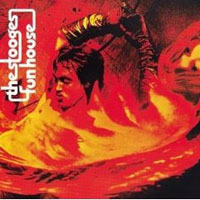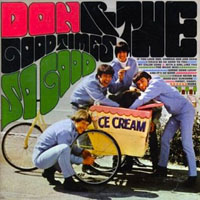THE STOOGES, FUNHOUSE and DON GALLUCCI
 |
 |
A Belated Appreciation
By Wally Shoup
(April 2009)
The seminal and highly influential Stooges album Funhouse is fast approaching its 40th anniversary. Given the recent death of guitarist Ron Asheton, it will undoubtedly be re-spun, re-appraised, and once again, re-affirmed as a true American classic. The Real F-ing Deal.After making a loud thud initially (commercially speaking), it has developed mythical status as the "First Punk Record." Bands worldwide claim it as their strongest influence.
It's an amazing record. I bought it back in the day, loved it then, love it now. It's just as feral, virile and skanky today as when the needle dropped in 1970. Nothing about it sounds dated. Also, around that time, another album came out called Touch, a monumental slab of psychedelic wonder that dazzled the cognoscenti, but, like Funhouse, failed to sell records and quickly dropped into obscurity.
What these two LP's had in common was Don Gallucci.
For me, that was always significant. Both records were exceptional (even by late '60's standards): completely original visions and a terrific sound. But two records could not have been more dissimilar: TOUCH - otherworldly, lush and complex; Funhouse – primal, raw, and gritty. How did this one musician become part of both?
Maybe, in answering this, I can also shed some light on Don Gallucci's contribution to Funhouse, something long over-looked and under-appreciated.
Don started young as a musician, playing keyboards. By 1970, he had been a member of the Kingsman (heard on the classic recording of "Louie, Louie"); the leader of Don & the Goodtimes, a popular NW band; the leader of the TV house band for Where The Action Is; and, most importantly, the creative force behind Touch.
For those few who heard it, Touch made a lasting impression. It pushed rock into previously unexplored areas and laid the groundwork for later, heralded, progressive rock groups, such as Yes, Genesis and King Crimson. I've written about it elsewhere, and I urge anyone interested in creative, progressive rock from the acid-rock period to check it out.
So, by the time he produced the Funhouse sessions, Don Gallucci was an experienced, highly creative musician - both a seasoned pro and visionary wrapped in one. Had Touch taken off, Don would have been viewed in a wholly different light. A much loftier and revered one. No doubt about it.
But, that was not to be. Touch went nowhere and Don soon found himself the house producer for Elektra Records, happy to have a job, and handed the assignment of producing The Stooges' second album.
I've always been curious as to how Don viewed those days. After a recent phone conversation, here's what I learned (all quotes are his).
He was flown to NY, saw the Stooges play live, was intrigued by the music and the show, complete with Iggy pouring candlewax on himself, but told Jac Holzman, head of Elektra, that it couldn't be captured on tape. It was an "act" – a live performance experience, complete unto itself. Holzman, however, was un-deterred, and the Stooges were brought to Electra's new L.A. studio.
Don, much to his credit, is very candid about the experience. The Stooges were not happy with him. They didn't want a producer, much less a staff producer, and viewed him as a "suit." Most recorded music, to them, was "contrived, pretentious and phony - in a word 'lame'." Convinced there was a conspiracy against real music, they didn't want a producer tinkering with their sound or pushing them in a direction other than their own.
Don, also much to his credit, didn't try to. He heard the integrity in their sound and felt that he "got it." They had their "genre down." What genre, I ask? "I don't know. I'm not sure they knew. But they knew when it felt right, when the sound in the room felt right." To him, their music was "minimalist, yet seamless, with every piece fitting into place, creating a trance-like state. They knew adding too many chords or other stuff would break the trance".
Plus, the studio was far too pristine, set up for folk musicians, not " garage rockers," and the engineer, Brian Ross-Myring, was an old-school Britisher, complete with coat and tie. So, Don went about taking out the baffles, curtains, and fancy rugs. The idea was to make "them comfortable and turn the studio into a stage," so as to let them perform. Iggy was given a hand-held mic, a small PA, while the other guys played behind him. Everything was recorded live – take after take of each song - with plenty of bleed. So, you and the engineer were their 'audience', so to speak? "Yeah, two guys they didn't even like."
Few changes, if any, were made. Though "raw, they were flawless and knew exactly what they wanted". Different tempos were tried and an over-dubbed guitar part added here and there, but the music heard on the record represents exactly what was played in the studio. This was a radical departure from standard rock recording techniques at the time, and Don deserves a lot deal of credit for using this approach. His attitude was "don't mess with it". Personally, I think he's being a little modest. Many a band has played great in the studio, but few have a record that sounds anything like Funhouse. That took an intuitive producer and quality engineer, both of whom had studio chops, savvy and great ears.
When I first heard Funhouse, I was struck by the quality of the 'grooves', how the bass, drum and guitar inter-lock into these incredibly compelling riffs that were at once propulsive and hypnotic yet melodic. There was a little strut, some swagger, but, mostly, they slithered. Ten seconds into "Down on the Street" and you're hooked. I definitely heard the black influence – the 'Bo Diddley' beat, Willie Dixon, James Brown, the King Curtis/John Coltrane sax (via Steve MacKay) – but filtered through a new sensibility. I ask Don if heard that. "Yes, what they gave Iggy was a quality base: a strong groove and attitude, for honest emoting. All the great blues had that." In particular, Ron's guitar playing was "refined, elegant but not opulent. He was disciplined, yet creative, which is rare, and his fills were perfect."
Now, a word about Iggy. The Stooges without Iggy are unimaginable. He's their sound made flesh. Grooves or no grooves, Iggy's the attraction. Has there been a better showman in the history of rock 'n roll? But, remember, when I first heard the record, it was completely an aural experience. I'd never seen them. Yet, the crazed performance energy came through fully intact. Don's convinced that that by adding "warmth and balance and some control," he helped capture a "magic moment" that was Funhouse.
Iggy didn't agree. He didn't like the record. Don thinks that just " by reducing their act to vinyl, by setting it in time," it put Iggy too close to an industry he didn't respect. Hearing that, I was reminded of the famous Jackson Pollock story where he berated the guy photographing him painting: 'I'm not the phony, you're the phony.' Jac Holzman was pleased though, and told Don he had done a good job. Jac "knew."
Asked if the Stooges came to respect him over the course of the recording and after it was completed, his answer is, simply, "no." And when their 2003 re-union finally took place in London specifically to play Funhouse ("have you ever heard of a band getting back together just to play an album?"), he was pointedly ignored by everyone except Ron, who greeted him warmly.
So, this tale has a bittersweet lining, and Don is frank about that. "I'm not going to claim that this was some kind of wonderful collaboration". But I don't detect a hint of bitterness. Instead, I hear humility. To Don, his "proudest achievement was 'I didn't screw it up'."
Don Gallucci's name will forever be linked with Funhouse, and it will go down in history. It's a landmark recording. Could the Stooges have achieved this without him? Maybe yes, maybe no, but Don was integrally involved in the process. Most record producers are lauded for what they do, but Don should be appreciated for what he didn't do. He heard the quality of the Stooges music and got out of their way. Not only did he not "screw it up," he helped record a masterpiece. And for that, he definitely deserves a share of the praise - the proof is right there in the pudding.
Also see our Ron Asheton interview and our Stooges feature